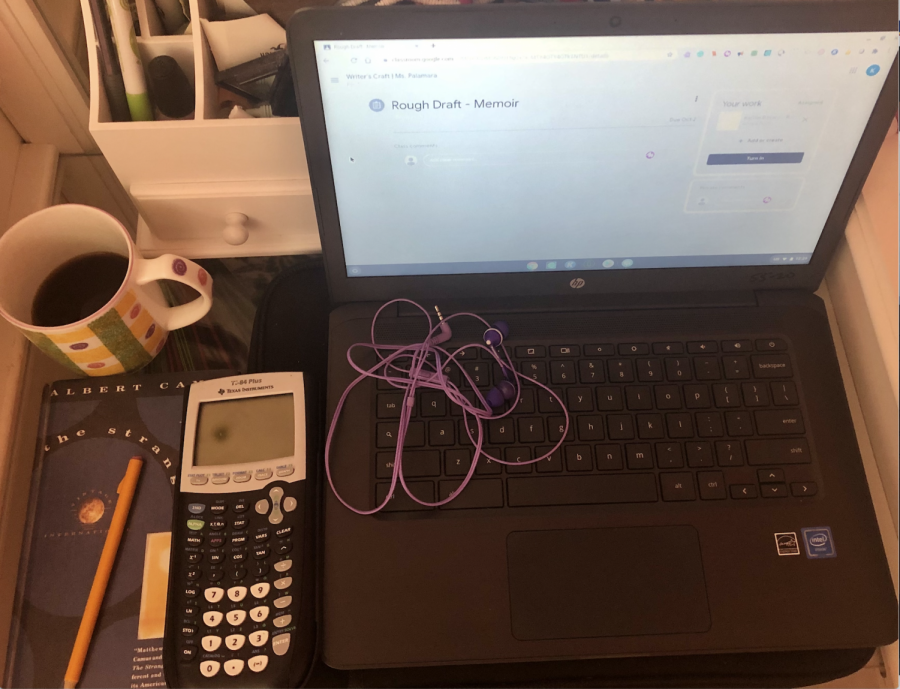Why the 70 minute periods need to go
Photo Kaitlin Bavaro
Kaitlin Bavaro’s at home workspace.
This school year is, without a doubt, unlike any other we have ever experienced. During these unprecedented times, one struggle that WHS students did not expect to have were 70 minute class periods.
No school in the Westfield School District has ever had classes this long before. Both teachers and students are not used to one class period being nearly doubled in length. These 70 minute class periods have got to go.
The logic behind the longer class periods is easy to understand. Instead of sitting at our computers all day long, we only have four classes so that we have time to eat lunch, do our homework, relax or go to any sport or extracurricular we might have. This schedule made sense when we had in-person school because we couldn’t be together for too long for safety precautions and we needed time to eat. Since classes don’t meet every weekday anymore, class periods are longer to meet up for lost time. However, that doesn’t mean it is ideal for students.
Sitting at a computer for four 70 minute classes straight isn’t healthy. According to Johns Hopkins All Children’s Hospital, too much technology usage is directly related to back and neck pains because of how many hours a day in a row teens sit hunched in front of their computers or tablets. This could eventually lead to permanent damage in teen’s backs and necks. They also recommend at most two hours a day of screen time, and they encourage multiple breaks from our devices throughout the day.
The breaks in between classes are helpful. In fact, the breaks in between classes are the only things keeping me sane. However, five minutes isn’t nearly enough time to get a snack, use the bathroom, stretch, or print something out last minute. There have been instances where I’ve been late to class because of my slow printer, or a last minute trip to the bathroom. Students and teachers are sitting in the same spot and looking at the same screen from 8:00a.m. -12:55p.m.
It’s also difficult to pay attention and stay motivated throughout the day. At least twice a day, I find myself exasperated when I look down at the time to see that there is still 30 minutes left of class. Just one class can feel like an eternity, which makes it that much harder to stay focused for the entire time. By the end of the day, my workspace is a total mess and all I want to do is turn off my computer and take a nap.
On top of the dreaded 70 minute periods, we also have a schedule that seems to always be changing. I understand that these are confusing times and administration just wants to keep us safe, but the constantly changing schedule just makes it much harder to adjust to this already crazy school year. Hopefully, later in the year we can get a schedule that sticks.
Frankly, 60 minute classes, or even 55 minute classes, would be sufficient. We would still have extra class time but they wouldn’t feel as long. This is much healthier for both students and teachers, and it would give us more time to spend outdoors and be physically active.
I appreciate how hard our administrators are working to not only keep us safe, but also provide us with as much normalcy for this school year as they can. I just think that these 70 minute class periods are causing more problems than they are solving.


russell brown • Mar 26, 2021 at 8:29 pm
We have had 70 minute high school periods in Australia for some time. In fact, nobody under the age of 40 can even remember when they were introduced. The old standard length when I was young was 40 to 50 minutes, which was possibly a little short, so 55 minutes would probably be the ideal.
Nobody seems to have presented any scientifically valid evidence to support the introduction of the 70 minute periods and none has since been put forward to validate any advantage. However, over time (at least in this country) the 70 minute period has become an immutable educational dogma, not to be questioned or challenged.
In my experience, the last 15 to 20 minutes of the 70 minutes of study in academic subjects tends to be turned over to the students for “revision work,” and in time this becomes an accustomed norm. What this means in practice is that an hour or more of direct teaching per day is “lost in the system,” never to be recovered.
My opinion is that the long periods tend to favor the more gifted and dedicated students at the expense of those who struggle to maintain their focus. So it may be that 10 to 20% of the students are doing as well or better while the rest obtain no advantage or are not traveling as well.
. Of course, with ALL the schools running 70 minute periods, there is no way to make any sort of effective comparison in the same way that if all nations were run as military dictatorships, the advantages or otherwise of democracy could not be demonstrated and would thus be irrelevant.
RB